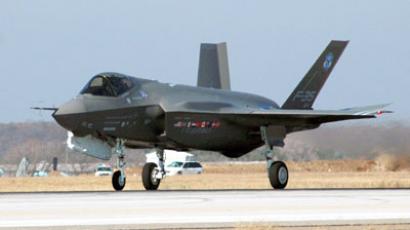The Pentagon: too big to fail?
Some lawmakers are doing all they can to prevent sequestration and defense cuts, largely citing jobs as the reason why the US can’t lessen funding to the military. But are defense contractors too big to fail?
With advanced fighter jets patrolling the sky and well-armed battleships sailing the seas, the United States has amassed the strongest military force in the world. But some in Washington believe proposed cuts to the US Defense Department would be devastating.“Defense cuts that I think could do real damage to our security, our troops and their families and our military’s ability to protect the nation,” said US Secretary of Defense Leon Panetta.In this age of austerity, Panetta painted a doomsday scenario that could occur if proposed cuts to the military budget go into effect.However, even if these cuts go through, many analysts believe American military spending will remain bloated.“I think a lot of Americans don’t realize how much bigger our military is compared to any other military on the planet,” said Ed Krayweski, an editor at Reason.com.“Our military spending has gone up every single year that I’ve been in office,” President Barack Obama explained during a debate with Mitt Romney.According to the Stockholm International Peace Research institute, the US actually spends more on defense than the next 13 countries combined.In 2012, The Department of Defense base budget was $549 billion, not including war funding. That is nearly twice as large as in 1999.“The military has grown exponentially since 9/11.This is a cut out of a department that has grown immeasurably.This is not going to decimate us. This is not catastrophic,” said Ben Freeman, national security fellow at the Project on Government Oversight.However, possible reductions to weapons systems has defense contractors worried. Their allies in Congress have sounded the alarm.“Up to 1 million jobs are at risk.My home state alone could lose up to 11 thousand jobs,” said US Senator Roger Wicker, a Republican from Mississippi.Many local economies have become reliant on government defense spending including in Southern California, where defense and aerospace firms employ thousands of people.“Out in the Antelope Valley we commonly refer to ourselves as the aerospace capital of the world out there,” said Norm Hickling, leputy Los Angeles County supervisor.The Antelope Valley, east of Los Angeles, is home to several defense firms.Hickling is worried about job losses if contractors are forced to cut back.“There are countless small businesses that have 10 or 20 employees that are going to hurt because they’re the ones who supply fasteners, equipment, supplies to other larger companies,” said Hicking.Southern California is where defense firm Northrop Grumman, is building the fuselage for the F-35. At $1 trillion, it’s the most expensive weapons program in history, and has been riddled with delays.Some economists believe that money can be spent better elsewhere. “This money gets committed to defense contractors and then they have to figure out ways how to spend it.When they do that, sometimes bad things happen,” said Richard Eskow, senior fellow at the Campaign for America’s Future.“A job that relies on wasting government money is not a job that is sustainable in a free economy,” said Krayweski.Studies also show that more money for defense firms doesn’t necessarily mean more jobs. The Project on Government Oversight conducted a study on employment at the top 5 contractors.Over the five-year period, total employment at the companies declined even as the total federal contract dollars awarded to the firms rose.“Research has found that military spending is one of the least effective ways the government can create jobs,” Freeman said.The military budget and its contractors have been sacred in the past.Critics blame the defense industry’s powerful lobbying arm, along with the revolving door in Washington.“There’s huge corruption.If you look at the number of generals who then turn around and become senior consultants or senior vice presidents with these defense contractors and they know it’s the classic revolving door,” said Eskow.While the US grapples with massive debts and deficits, current budget reductions will do little to cut military firepower or the size of lucrative defense contracts














